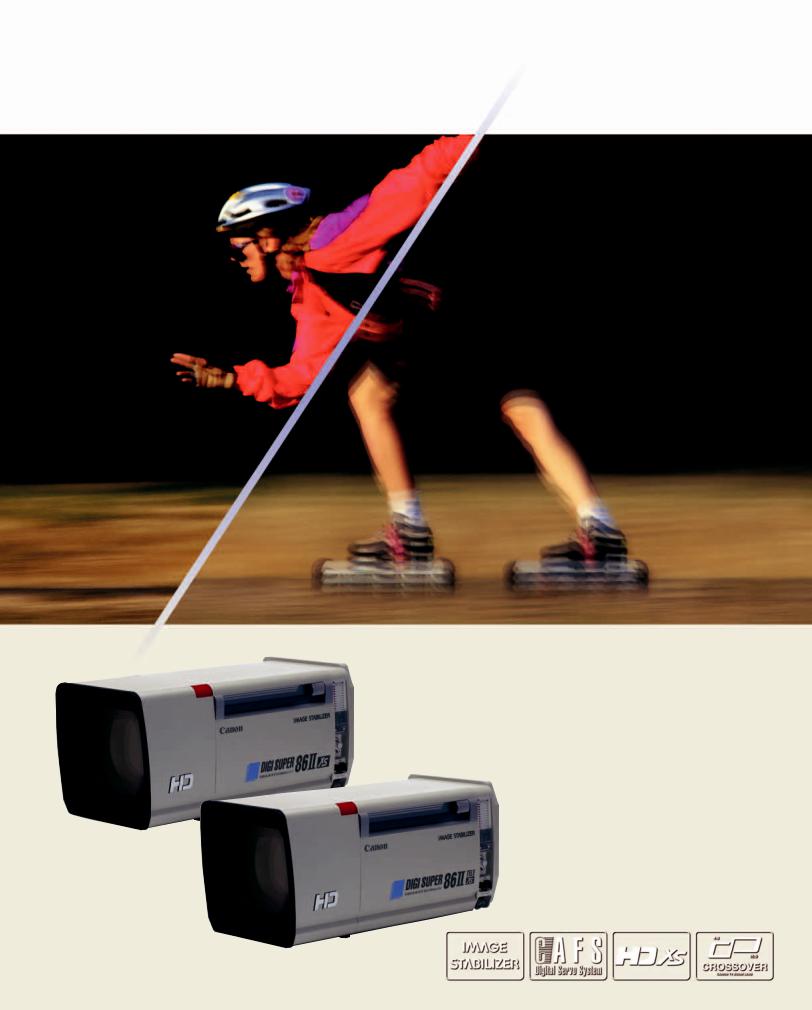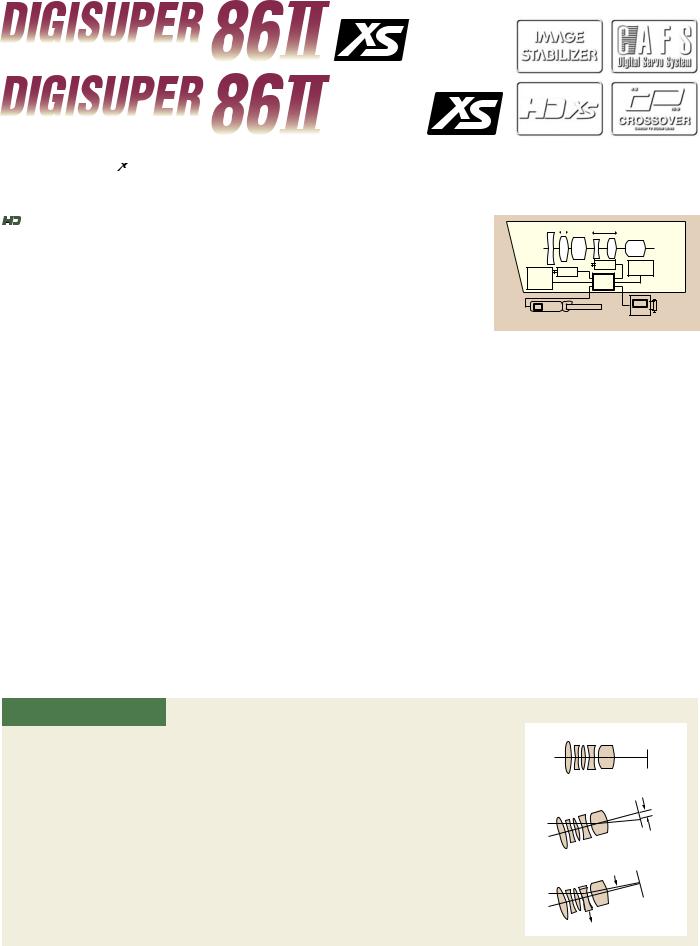Canon 86 TELE, 86 User Manual



 DIGISUPER 86
DIGISUPER 86
 DIGISUPER 86
DIGISUPER 86 TELE
TELE 
ULTRA HIGH ZOOM RATIO FIELD LENS
WITH IMAGE STABILIZER-
A TECHNOLOGY BREAKTHROUGH

XJ86x9.3B IE-II 9.3-800mm 1:1.7
XJ86x13.5B IE-II 13.5-1161mm 1:2.4 |
TELE |
|

 : The letters "
: The letters "  " come from the word "Excess", an indication that the new generation of
" come from the word "Excess", an indication that the new generation of 
 lenses exceeds all conventional lens specifications and concepts by using breakthrough technologies.
lenses exceeds all conventional lens specifications and concepts by using breakthrough technologies. 
 allows for higher specification lenses in smaller and lighter packages.
allows for higher specification lenses in smaller and lighter packages.
Optical Performance with an 86x
Zoom Ratio and improved Wide Angle
The DIGISUPER 86II xs & DIGISUPER 86II TELE xs are an extraordinary field lens that utilizes Canon's new optical design concept "POWER OPTICAL SYSTEM" and  Element".
Element".
By adopting this new technology and concept, the DIGISUPER 86 xs realizes the necessary optical performance for HDTV, with increased zoom ratio of 86x, improved wide angle of 9.3mm while still maintaining the size equivalent to that of current SDTV lenses.
 -Element & POWER OPTICAL SYSTEM
-Element & POWER OPTICAL SYSTEM
Canon has developed this breakthrough optical design concept using a newly developed optical element in the most effective way.
We have named this design concept the "Power Optical System" which achieves higher specifications and quality using the optical " Element" which virtually eliminates aberrations.
Element" which virtually eliminates aberrations.
Image Stabilizer
The history of field lenses is a history of zoom ratio/focal length extension. It came to a point where the industry thought it
would be impossible to push the envelope any further. The telephoto focal lengths of the lens got so long that even the slightest amount of wind or operator movement would cause image shake and viewing the picture became intolerable, this was before Canon announced the incredible magnification DIGISUPER 86 xs zoom lens. Canon, renowned for its optical image stabilization technologies, developed another new stabilization solution for the broadcast field lens, a built-in Optical Shift Image Stabilizer (Shift-IS) to overcome image shaking at telephoto focal length. Now the Shift-IS is employed in the DIGISUPER 86II xs & DIGISUPER 86II TELE xs.
"CAFS" Constant Angle Focusing System
The zooming effect of focus is the phenomena where the picture size (angle of view) changes when focusing (breathing). However, a 32bit CPU calculates and controls the zoom when focusing in order to counteract these phenomena. Thus the DIGISUPER 86II xs & DIGISUPER 86II TELExs have zero zooming effect of focus throughout the whole zoom range.
|
Focus |
Zoom |
|
|
Motor |
Motor |
Digital |
Digital |
32Bit |
Sensor |
|
Sensor |
|
|
|
|
CPU |
|
|
|
|
|
CPU
CPU
Digital Servo System
CROSSOVER COMPATIBILITY
Available optionally is the dual aspect ratio switching system, "CROSSOVER", for switchable 16:9/4:3 cameras.
Latest Generation DIGITAL SERVO SYSTEM
Canon's latest generation digital servo system allows the use of many new functions such as constant angle of view while focusing "CAFS" and the selection of different servo characteristics.
These functions are only possible with a digital servo system. In addition to these new functions, the upgrading of software will be possible when new functions become available in the future. This means that the DIGISUPER 86II xs & DIGISUPER 86II TELExs have unlimited possibilities.
Image Stabilizer
How the Optical Shift Image Stabilizer (Shift-IS) Works
When the lens moves, the light rays from the subject are bent relative to the optical axis, resulting in an unsteady image because the light rays are deflected. By shifting the IS lens group on a plane perpendicular to the optical axis to counter the degree of image shake, the light rays reaching the image plane can be steadied. Since image shake occurs in both horizontal and vertical directions, two shake-detecting sensors for yaw and pitch, detect the angle and speed of movement and send this information to a high-speed 32-bit microcomputer, which converts the information into drive signals for the IS lens group. Then the actuator moves the IS lens group horizontally and vertically thus counteracting the image shake and maintaining the stable picture. The Shift-IS component is located within the lens groups and is most effective for lower frequency movements caused by platform vibration or wind effect without increasing the overall size and weight of the master lens.
1.Lens when still.
Image plane
To Subject
2.Lens when jerked downward.
Camera shake
3.Counteraction by IS lens group.
Corrected light rays
Position of IS lens group after shifting
